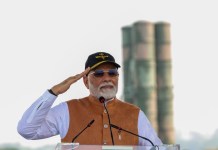19 years after the United States deployed its troops in Afghanistan as a reaction to the deadly 9/11 attacks, a peace deal has been signed with the Taliban today which means that the U.S. and NATO allies will pull its troops from the Afghan soil.
India Used Israeli Spyware To Target Top Pakistani Officials, Diplomats
The deal was signed in the presence of leaders from several countries including India and Pakistan. In what is termed as a historic deal, the United States along with the Afghanistan government and the Taliban agreed on a peace treaty that will help establish stability in the war-torn country.
In a joint statement released by Afghanistan and the US government, it was decided that the NATO troops in Afghanistan will be withdrawn in 14 months. As part of the agreement, the Afghan government is set to remove Taliban members from the United Nations Security Council’s sanction list.
Among the countries present was India who has been a key stakeholder in Afghanistan. P Kumaran, India’s envoy to Qatar, became the first Indian official to attend an event involving the Taliban. However, with this move, India has gone against its long-lasting policy of not holding any negotiations with the Taliban.
During his recent visit to India, United States President Donald Trump mentioned that he spoke the matter to Prime Minister Modi and said that everybody is “happy” about the deal. A day before the deal, foreign secretary Harsh Vardhan Shringla paid a visit to Afghanistan and met Ashraf Ghani, the President and handed over a letter from PM Modi.
Implications For India
Although everything is in place but everything depends on the extent of the commitment from both parties, especially the Taliban. The deal also has opened up a dialogue within Afghanistan as the Taliban seeks for the release of its 5,000 prisoners.
The Taliban that has gone on record calling the current regime as a puppet in the hands of the US has so far refused to hold any dialogue. The date for the intra-Afghan talks is set as March 10.
This is where India can come in, especially, after knowing that the Taliban is backed by Pakistan. The shrinkage of the Taliban’s powers in Afghanistan means a victory for India. However, India has, for long, refused to fight any war in Afghanistan. India is more focused on holding the intra-Afghan talks.
From an economic perspective, India has the most to lose in Afghanistan if the Taliban gets overwhelming powers. India has established itself to be a major influencer across the country – from improving infrastructure to Bollywood Gossip dominating its newspapers. Will India be able to push its foreign policy spotting the opportunity to corner Pakistan yet again?




